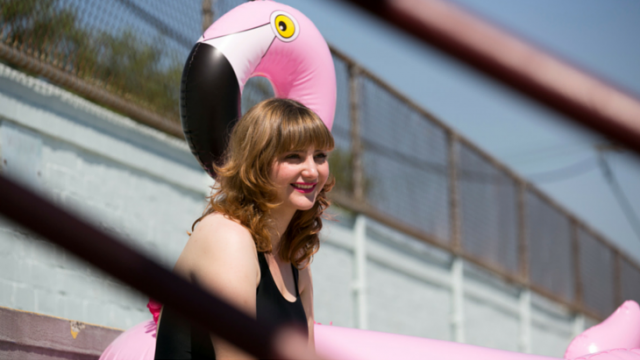Marco Polo
‘Marco Polo’? No, not the explorer. Laura Davis clears this up right off. Here, ‘Marco Polo’ is a game of tag, usually played in a swimming pool. One player is blindfolded and calls out ‘Marco’. Other players respond ‘Polo’ and the blindfolded player tries to catch them. There is no known connection between the explorer and the game. That fact – or non-fact – and the game itself, launches the mode and tone for 50 minutes of disconnected bits and bobs. Ms Davis stands before us in a swimming cossie – and she’s blindfolded. It’s a metaphor, I suppose, but not really pursued or developed.
She stays blindfolded throughout and assures us that she really can’t see us - because she’d prefer not to see how many people are in tonight and whether or not the show is going well. We are not obliged to laugh and we can leave if we want as long as we do it quietly. A blow-up pool toy – a flamingo – sits stage left and completes the swimming pool setting – although completing the swimming pool setting is all it does. A machine intermittently blows smoke onto the playing space, which is completed with an aluminium ladder. Ms Davis climbs this ladder from time to time and also uses it to locate herself and to find her water (?) bottle from which she swigs frequently.
Later, Ms Davis asks the audience questions, tagged with ‘Marco?’ Anyone who wants to answer the question (such as, ‘does anyone have a hobby?’) calls out ‘Polo’ and blindfolded Ms Davis directs her attention to the voice. There are gags, but not a lot of them. There is some standard observational comedy – like, ‘why is the handle on the maple syrup bottle so small?’ Ms Davis likes that one: she returns to it several times. But there are no sustained riffs – such as her brilliant, cruel and subversive number on after-school care. (You can see it on YouTube.)
This is a bemusing, not to say puzzling show. Its elements feel arbitrarily assembled. While it proceeds with Ms Davis’ characteristic carefully calculated bumbling, rambling style – here including pretending to forget where she’s up to – she keeps her vitality well in check. Her manner fails to generate that noted intimacy of her previous outings. On the contrary, here it generates tension. Naturally, the audience wants more than a good time (and she knows this), but we also want the performer to succeed. As she flounders – or appears to flounder - we grow tense – and not just about her falling off her ladder.
Reviews of her 2015 show, Ghost Machine, said: ‘Davis is performative [sic], intelligent and vibrant…’ Or, ‘[This is] a complex and layered show about the bleaker edges of existence from a compelling performer…’ Sadly, there is not much sign of such things in Marco Polo.
At the start, Ms Davis tells us that this is her ninth comedy festival show, but that now she’s ‘In a relationship’ and very happy and that (therefore) she doesn’t really need this show. That makes sense: grievance, despair and anger are reliable spurs for comedy. And it’s a good start to this show since her previous shows have been based on life’s miseries and existential angst.
But not really needing this show may indeed be the key to its flat and at times quietly desperate nature. If I may speculate, Ms Davis, dubbed ‘the comedians’ comedian’, has been winning praise and awards since 2008 when she won the Triple R RAW Comedy Award. She was 19. Her 2014 show, Pillow of Strength, got rave reviews. Ghost Machine won her a Golden Gibber in 2015 and a Moosehead Award to develop Marco Polo. Well… She then had to come up with a show, didn’t she? And run it in the 2016 Comedy Festival. Maybe she wasn’t ready; maybe she was too happy; maybe – and temporarily – she’d run out of things to say. It’s unfortunate, but there it is.
Michael Brindley
Subscribe to our E-Newsletter, buy our latest print edition or find a Performing Arts book at Book Nook.

